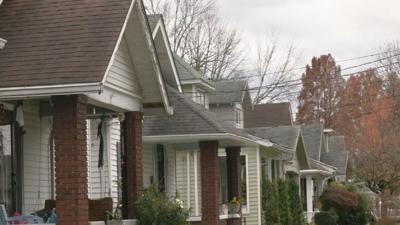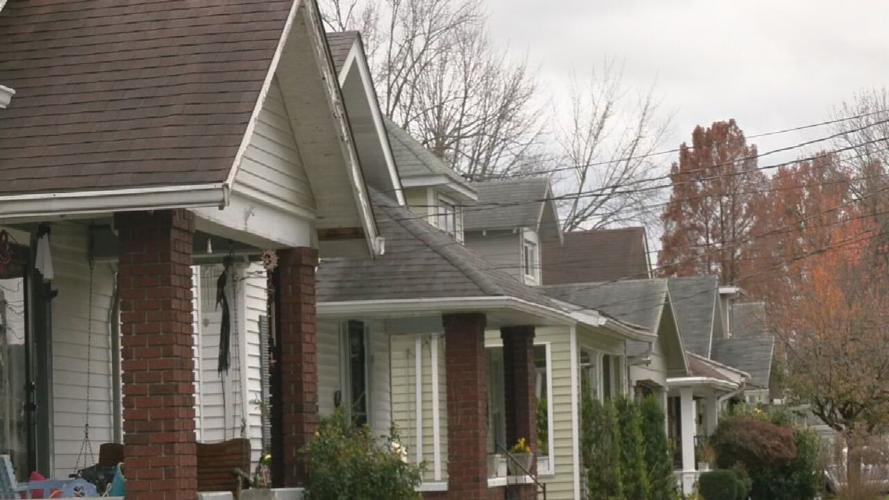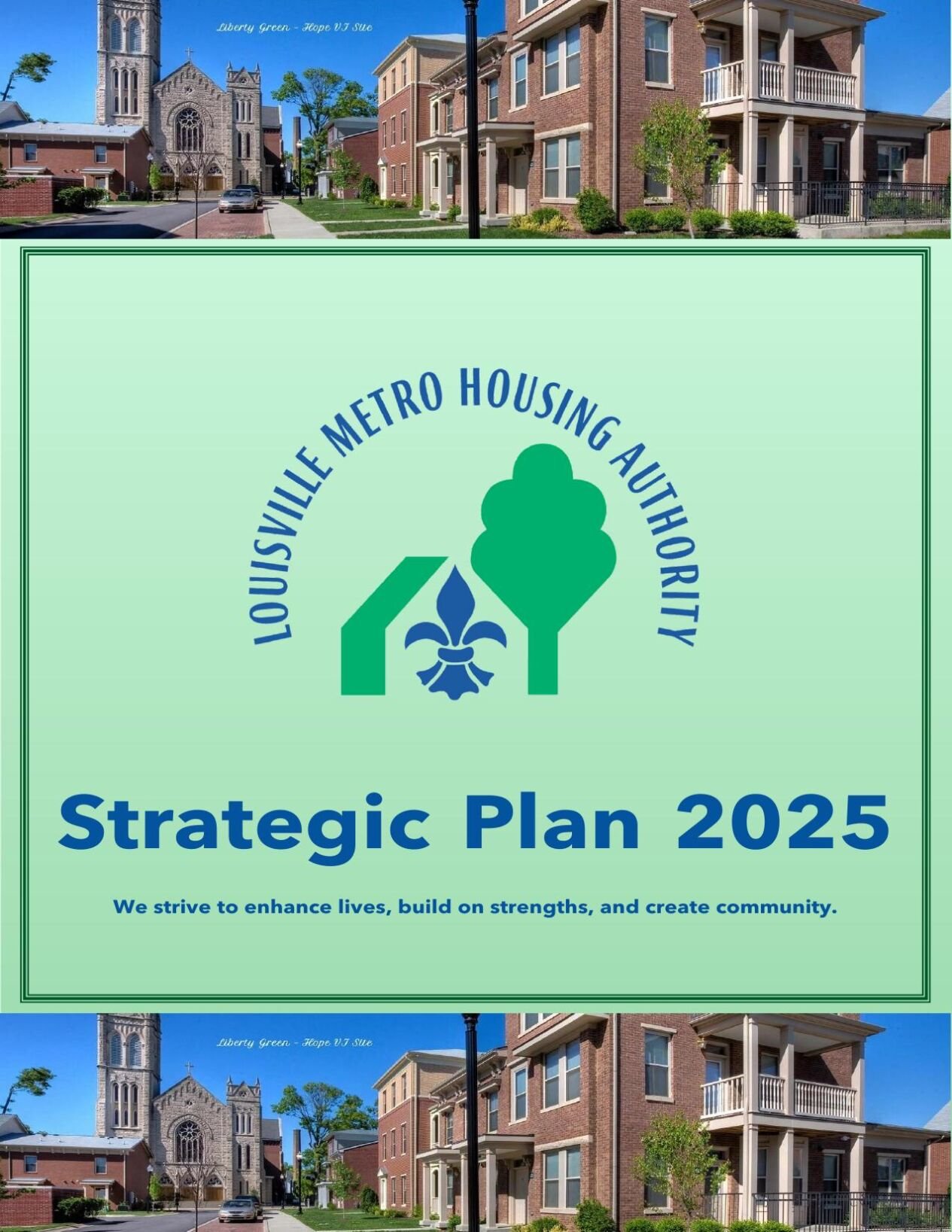LOUISVILLE, Ky. (WDRB) -- Some of Louisville's public housing is in desperate need of upgrades. As city leaders try to figure out how to fix the issues, they're also bracing for possible funding cuts.
Every Tuesday, a local food pantry delivers essential groceries to residents of Louisville's Park Hill neighborhood. With the nearest grocery store miles away, these deliveries are a lifeline for many in the community.
Beyond food, Park Hill faces other challenges, like the absence of a laundry facility. Without one on-site, residents often resort to using the railings outside as makeshift dryers.
Brittany Parker lives in the neighborhood. As a member of the resident council, Parker is advocating for improvements to the neighborhood, urging the Louisville Metro Housing Authority to clean up and remodel the area.
"They were supposed to build more affordable housing on the other side," Parker said Tuesday. "I don't know exactly what's going on with that, but it was something we were looking forward to."
Elizabeth Strojan, LMHA's executive director, has been leading the agency for about a year and acknowledges the significant needs within Louisville's public housing.
Maintenance staff have completed over 34,000 work orders over the last year as issues mount at its buildings. Even the building where Strojan and her staff work requires plumbing repairs.
"We've written everything down in one place—all the things we're working on," Strojan said.
Strojan, who was hired to overhaul public housing in Louisville, has been leading the effort to address longstanding issues at Dosker Manor from what she called "decades of neglect."
In August 2023, residents said complaints of dirty hallways, mold, bedbugs and crime were being ignored. Metro Council later ordered an investigation of LMHA.
LMHA and the city surveyed residents about their experiences in an effort to improve their living conditions. Ultimately, Strojan said it would be best to start fresh, calling for the public housing complex to be torn down and rebuilt because it would be too expensive to rehabilitate.
Last summer, LMHA began relocating more than 500 residents from Dosker Manor. The first 100 or so were being sent to LMHA-owned properties around the city. The remaining 400 plus residents will go into low-income housing around the city.
In July, LMHA said they had 100 apartments open and ready for residents being moved from Dosker Manor.
From the beginning, LMHA has said that it would take almost a year and-a-half to get every resident moved out, faced with a challenge of finding suitable apartments in a tight rental market. The apartment occupancy rate in Louisville is over 90%. LMHA is competing for low-income apartments, finding suitable accommodations for everyone currently living at Dosker will require LMHA to create housing.
Dosker Manor will be demolished in 2026, and LMHA has chosen local firm LDG Development to lead the reconstruction. The housing authority said LDG beat out more than a dozen development firms for the project.
Plans for the new Dosker Manor include senior housing on the current site of the First Link corner store, while additional family housing will be built on the current grounds of the complex. The new development will not include high-rise buildings, a significant change from the current structure's unreliable elevator systems.
The exact timeline for Dosker Manor's redevelopment has not been finalized, but construction is expected to begin soon after the demolition is complete.
"It's moving quickly," Strojan said. "We're watching the numbers tick down, but it's not just about speed. We want to ensure every move is the right move."
LMHA operates on an annual budget of approximately $180 million, with 90% of its funding coming from the federal government. As with many federally-funded agencies, LMHA keeps a close eye on developments in Washington that are adding pressure.
"We're serving people who are increasingly vulnerable," Strojan said. "The programs we rely on from HUD are essential. There's no need for alarm right now, but it’s important to emphasize how vital these programs are."
Making improvements and relocating residents will take time, and requires LMHA to be strategic with its funding.
"We can’t tackle one issue at a time. We can’t focus solely on public housing and delay Section 8 improvements. We can’t postpone internal operational upgrades," said Strojan. "There's a lot to do this year, and the backbone of our efforts is improving our internal operations."
For those living in Louisville’s public housing, these developments impact their daily lives.
"We need all the help we can get—food, resources, even just basic daily necessities," Parker said.
As LMHA works through these challenges, the people of Park Hill and other public housing communities continue to push for the support and resources they need to make their homes livable and sustainable.
The Louisville Metro Housing Authority has a comprehensive strategic plan in place to reach its goals. It outlines four key priorities:
- Affordable Housing Expansion:
- Increasing access to quality housing through new developments, preservation efforts, and maximizing Housing Choice Vouchers.
- Resident Empowerment:
- Strengthening programs supporting education, employment, and financial independence while expanding partnerships for essential services.
- Operational Excellence:
- Enhancing technology, improving customer service, and streamlining internal processes to better serve residents and stakeholders.
- Financial Sustainability:
- Securing diverse funding sources and advocating for increased local, state, and federal resources to support LMHA’s long-term impact.
More than 10,000 households get federal rental assistance through LMHA.
Earlier this year, Louisville Mayor Craig Greenberg outlined the city's legislative priorities, including a push to create more housing. Greenberg said the city is pushing forward the establishment or expansion of five initiatives spearheaded by the Kentucky Housing Task Force:
- State Affordable Housing Tax Credit:
- Many states have created their own version of Low-Income Housing Tax Credit to pair with the federal program. These can be targeted to both rental properties and single-family homeownership.
- First-time Homebuyer Tax Credit:
- This program would offer qualifying, first-time homebuyers down payment assistance. Indiana has a successful program that provides up to 6% down payment assistance in the form of an interest- and payment-free second mortgage (to be repaid in full if the borrower chooses to refinance or sell within the forgiveness period).
- Revolving loan fund for workforce housing:
- Establish and capitalize a fund at the Kentucky Housing Corporation to provide financing for housing development for working families. This program would complement the Affordable Housing Trust Fund, which supports projects serving our lowest income households. Other states have successfully provided construction loans at 0% interest rates and a 24-month term.
- Housing support from state economic development tools:
- Expand the use of industrial revenue bonds to fund affordable housing projects by modifying the definition of "building" or "industrial building" in KRS 103.200(1) to include affordable housing projects.
- Tax Increment Financing Updates:
- Adjust the methodology for evaluating tax increment financing projects to make it easier to fund housing development in urban areas.
Related Stories:
- Louisville leaders hold session for community members needing help with Section 8 housing
- Dosker Manor resident faces challenges while searching for ADA apartment
- 100th resident leaves dilapidated Louisville housing complex, a place where people 'lost hope'
- LMHA finding a way to tackle critical shortage of affordable housing in Louisville
Copyright 2025 WDRB Media. All Rights Reserved.















